
8 minute read
How to put a smile on your child’s face
How To Put a Smile on Your Child’s Face (without the eco guilt) By Karen Maurice @N4Mummy
We all want to make our kids smile. And it doesn’t take much; a sweet at the school gate, a new toy or a packet of crisps. But it’s always bothered me that so many of the things my children love just aren’t that great for our world. Whether it’s the food wrapped in single-use plastic or a cheap toy that I know won’t last two seconds. And we’ve all been there when our children don’t get what they want and wished the ground would swallow us up whole. Which is why I’ve come up with a few simple eco swaps for the things my kids beg me for most. In the hope that those hideous tantrums can be avoided.
Advertisement
Find Second-hand plastic toys
Wooden toys look good and are good for our environment. But give a child the choice and they’ll opt for the noise making, light flashing, brightly coloured plastic version. So, buy them second hand. Look for fun plastic toys in charity shops, on local facebook groups, at school fairs, or just ask a friend who has older children. It’ll be kinder on your wallet and the environment. This year for Christmas we bought a marble run for our son from the school fair for a mere £3 and it kept both kids entertained for hours. Most importantly, just avoid the toy aisle in the supermarket.
Invest in biodegradable glitter
Glitter is usually made from plastic. Thousands of tiny bits that will not only stick in your carpet but will also be around for hundreds of years. So, invest in some biodegradable glitter. It is more expensive but, as you know, a little goes a long way. We got some this Christmas from the online eco-boutique Plastic Freedom and it’s been a real hit. My daughter finds any excuse to wear it, dressing up for the school disco or even to A&E when she broke her arm. It can be applied to the face with Aloe vera gel or used for crafts. Revolutionize the after school snack
Post nursery, my son greets me each day with “snack Mummy, snack.” And I either get a bright smile or epic tantrum depending on what I’ve brought. It’s easy for me to sit here and write that you should give your child a healthy snack that isn’t wrapped in single use plastic. But far harder to do this in reality. So, I’d encourage you to try giving them something like an apple or banana where nature has given its own packaging. But make sure you go to school with nothing else in your bag and a big dose of stubbornness on your part. After all, if they are truly hungry then they might just eat it.
Find alternative sweet treats
Individually wrapped sweets aren’t great from a single use plastic perspective. But everyone loves a treat once in a while. So, find some simple biscuit or cake recipes to do that job. I’m not a baker, so I make easy things like shortbread, chocolate tiffin or crispy cakes. It’s a great activity to do with the kids. They love to get their hands messy and will always fight over who’s going to lick out the bowl.
Get back to nature
And finally, I’ve noticed that my kids are happiest in the great outdoors. Some of our best family times together have been on walks in London. We love exploring Hampstead Heath, Alexandra Palace and many other big green spaces. For my children, the freedom to run wild, climb trees, make dens and get covered in mud just makes them smile. And the fresh air wears them out, so they sleep better which in turn makes us smile too.
Karen with her husband James, children Daisy (5),Laurie (3) and baby Clara
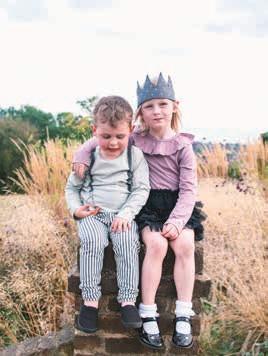
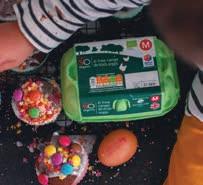
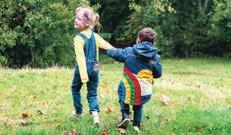
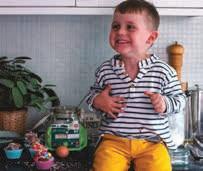
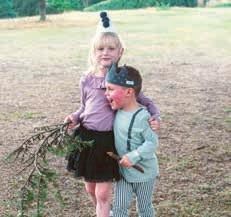
Exam preparation and revision techniques The dos and don’ts for your child’s success
The most widely shared revision tips and strategies have not changed much over the course of the 21st century. We as parents often find ourselves giving our children the same advice as we were given back in the day: trawl textbooks, highlight key information and test yourself. In recent years however, research evidence that distinguishes effective from ineffective revision strategies has proliferated and there is far more knowledge to be drawn upon. North London’s high-achieving, mixed ability schools group for ages two to 18, North Bridge House, takes a researchinformed approach to teaching and learning and has tried and tested some of the most successful revision techniques to help your child through the exam period.
“There is a lot to be said for what has become a particularly hot topic in education: metacognition,” says Brendan Pavey, headteacher of the school’s senior campuses in Hampstead and Islington. “Encouraging children to reflect on how they learn helps them to identify what does and doesn’t work well for them, and aids their ability to choose the most effective thought processes for them as individual learners,” he continues. Several of North Bridge House Senior Schools’ teaching staff are part of a joint research project with UCL, attending the worldleading Institute of Education to contribute to the academic body of research around personalised learning and further develop their own strategies to support students as independent, metacognitive learners.
The key to any successful learning or revision technique is doing. Writing, designing, constructing, creating, doing something will prove far more fruitful than the age-old idea of skimming and highlighting texts. Passive consumption of information is not a valuable use of time and North Bridge House positively advises students to ditch the highlighters and avoid the trap of simply ‘re-reading’.
“Instead, we advise students preparing for their exams to focus on more challenging activities such as self-quizzing,” says
Brendan. “Furthermore, acknowledge that mass revision and cramming is less effective than a planned revision schedule, which not only breaks down your subjects into topics but outlines those activities – those ‘doing’ things,” he says.
There are also many excellent resources available to students (and parents.) on research-tested revision strategies. The Learning Scientists website is a good starting point and the Sandringham Memory Clock is a model worth exploring. However, to help any child through their exam preparation, you first need to have the fundamentals in place.

A designated space is essential to effective revision and this space needs to be fit for purpose. The peace and quiet of the bedroom is often misused; comfort is essential to productivity, but the bedroom should remain the all-important sleeping and head space needed to rejuvenate. Help your child to create the optimum study area by establishing a structured zone, free from clutter and distractions with a desk, plenty of natural light and supplies to keep them energised: water, fruit, nuts and dark chocolate – all the best ‘brain foods’!
Sleep and exercise are equally as important to the revision timetable in order to help memory formation and diffuse the inevitable pressure that comes with exams respectively. There is no denying that the exam season can be equally stressful for both parents and children. “Accept that it can be stressful,” says Brendan. “The emotions of our children are real, intense and we should respect them as we would for any adult. We should let our children know that it is okay to find the whole process stressful, normalise it, and start to teach our children that difficult situations are a part of life that can lead to very positive outcomes.”
While it is important to talk to your child in order to help structure and reassure them during their exam preparation, it can sometimes be difficult to get them to engage in conversation amid this stress – and increasingly so as they approach their turbulent teenage years. Planning a fun, spontaneous outing or activity can encourage them to open up, and will provide them with the light relief and down time that is very much necessary to their overall approach, performance and wellbeing. “Happy children learn best and family trips to see the latest superhero film or to their favourite restaurant can be fuel for the heart and soul – and brain,” Brendan reminds us.
At North Bridge House, staff and students have also worked with the University of York’s Psychology department to ascertain the impact of distraction on working memory, specifically, the effect of listening to music. Contrary to student protestations and in line with the Cognitive Load Theory, listening to music while revising is detrimental to effective learning.
During learning, information must be held in our working memory – the part of our mind that processes what we are currently doing – until it has been processed sufficiently to pass into our long-term memory. Our working memory can only deal with a limited amount of information at one time and so learning is hampered when the radio or ‘background TV’ is using some of this capacity and detracting from the task in hand. You may not be popular with your child but if they are serious about their exam grades, they will thank you in the long run for suggesting they take out those headphones and turn off Netflix.
North Bridge House
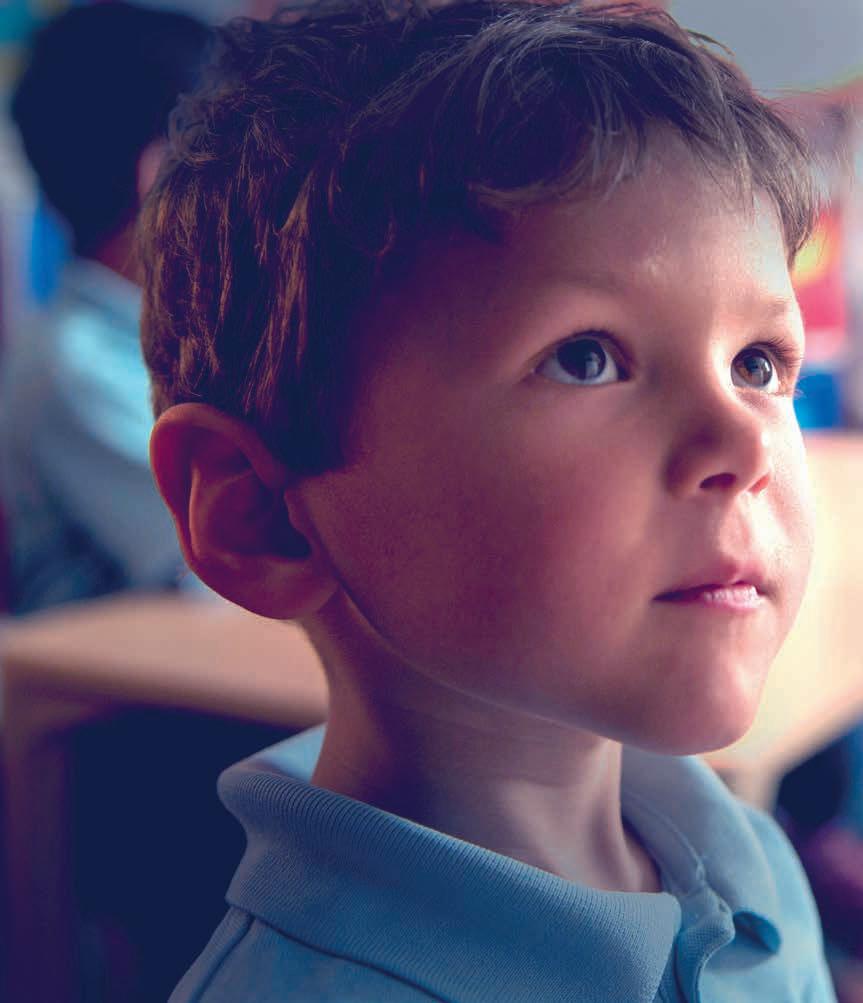
New location Nursery & Pre-Prep West Hampstead Opening Sept 2020
Book an open day at northbridgehouse.com/open
NURSERY & PRE-PREP HAMPSTEAD 2 - 7 YEARS TUESDAYS (NURSERY) FRIDAYS (PRE-PREP) MARCH - MAY NURSERY & PRE-PREP WEST HAMPSTEAD 2 - 7 YEARS NEW CAMPUS TOURS FROM MAY ENQUIRE NOW PREP SCHOOL REGENT’S PARK 7 - 13 YEARS FRIDAY 6 MARCH FRIDAY 15 MAY SENIOR HAMPSTEAD 11 - 16 YEARS THURSDAY 19 MARCH THURSDAY 30 APRIL THURSDAY 21 MAY SENIOR CANONBURY 11 - 18 YEARS THURSDAY 2 APRIL THURSDAY 7 MAY









